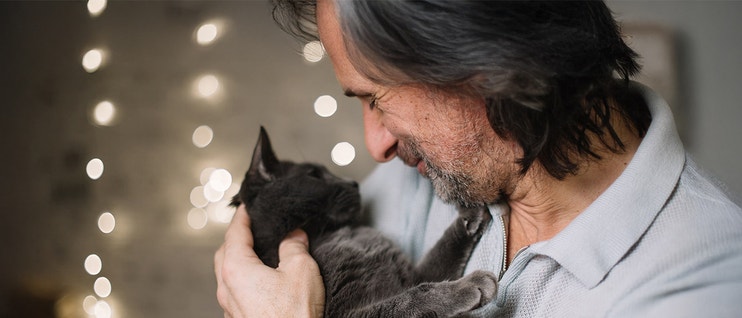
How To Let Your Cat Train You
The internet abounds with cat-training advice, but you know the truth: You can’t really train a cat. But maybe, just maybe, you can strengthen your bond by letting them train you. Here’s how.
Night walker
Whether they’re pouncing on you, nuzzling your ear or sitting on your head, chances are your cat has stirred you from your slumber on more than one occasion. They might be craving a midnight snack or pining for more social interaction. Try setting a timer on an automatic feeder to release food during the night, or play with them before you go to bed so they’re ready for a cat nap when you are.

"Oh, were you sleeping?
I didn't notice."
Vocal murmurs and mrrrows
Studies have shown1 that cats can meld their high-frequency natural cry with their appealing low-frequency purr. The resulting pleasant sound can trigger our nurturing instinct. In next to no time, you’re scratching your cat in their favorite spot or getting off the couch to fetch them food. Pretty clever for a kitty, eh?

"My preferred love
language? You
doing what I say."
Table of Contents
Under-using the litter Box
If your cat is avoiding their litter box, they may be demonstrating disdain for a particular type of litter, a dirty box or high sides that are difficult to climb over. Try a different litter, clean the box more often and make sure it’s accessible. If the behavior continues, consult your vet — the cause could be a medical issue.

"Oh, this?
This definitely wasn't me."
Biting the hand that pets them
Most cats love to be pet, as long as it’s on their terms. Your cat’s nibbles may be teaching you when to stop, where they prefer to be pet and how vigorously or softly to pet them.

"A little more to the
left — don't make
me ask twice."
I knead you
Kneading is your cat’s sincerest form of flattery. They’re simply saying they love you and feel contented: “You’re doing a good job — keep it up.” Or “Thanks for the SHEBA® PERFECT PORTIONS™ meal you fed me earlier. It was just what I wanted.”

"You're doing a
wonderful job."
While picking up on your cat’s cues and learning what makes them happy will strengthen your bond, avoid reinforcing negative behaviors. Instead, give them extra attention when they’re doing something you approve of. Of course, this may be exactly what they’ve been training you for all along.
References
McVeigh, K. (2009, July 13). Sound effect: How cats exploit the human need to nurture. Retrieved June 03, 2020, from https://www.theguardian.com(open in new tab)




